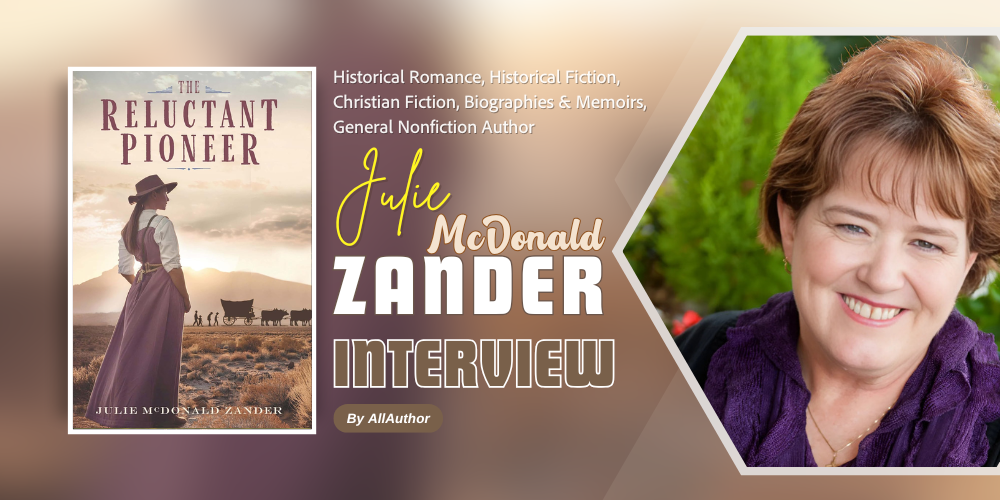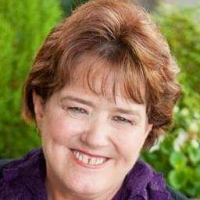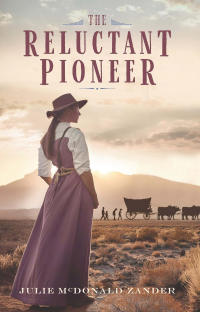Genre:
Historical Romance Historical Fiction Christian Fiction Biographies & Memoirs General Nonfiction- Country: United States
- Books: 2
- Profession: Author, newspaper columnist, personal historian
- Born: 23 July
- Member Since: Jan 2025
- Profile Views: 2,258
- Followers: 75
Julie McDonald Zander, who holds a bachelor’s in communications and political science from the University of Washington, worked as a newspaper reporter and editor before launching Chapters of Life (www.chaptersoflife.com) to capture and preserve life stories. She and her husband live in the Pacific Northwest, where they raised two children. Her nonfiction book about Matilda, Washington Territory’s Grand Lady, was a finalist for two national awards. The Reluctant Pioneer, her debut novel, was released in September 2024.
Julie McDonald Zander's Books
Stay in the loop on books by Julie McDonald Zander. See upcoming and best-selling books by the author here. You'll also find the deals on books by Julie McDonald Zander.
** Please note that the information or price displayed here may not be the updated. Make sure to double-check the latest book price before buying books.
** Also, there might be other books by Julie McDonald Zander not listed on AllAuthor.
| Book |
|---|
Shattered Peace: A Century of Silenceby Julie McDonald ZanderPublish: Mar 26, 2025Historical Fiction Christian Fiction |
The Reluctant Pioneer: Inspired by a True Storyby Julie McDonald ZanderPublish: Sep 09, 2024Historical Fiction Christian Fiction |
Julie McDonald Zander Interview On 14, Jul 2025
 "Julie McDonald Zander is a former newspaper reporter and editor with a bachelor’s degree in communications and political science from the University of Washington. She founded Chapters of Life to help preserve personal and community histories. Based in the Pacific Northwest with her husband, where they raised two children, Julie is the author of an award-finalist nonfiction book about Matilda, Washington Territory’s Grand Lady, and The Reluctant Pioneer, her debut novel released in September 2024."
"Julie McDonald Zander is a former newspaper reporter and editor with a bachelor’s degree in communications and political science from the University of Washington. She founded Chapters of Life to help preserve personal and community histories. Based in the Pacific Northwest with her husband, where they raised two children, Julie is the author of an award-finalist nonfiction book about Matilda, Washington Territory’s Grand Lady, and The Reluctant Pioneer, her debut novel released in September 2024."
In the early 1990s, I interviewed both my parents on videotape using a big box VHS recorder to capture their life stories. I knew only one of my grandparents as the other three had died before I was six months old. I always wanted to hear stories about them, and my parents were my only link to them.
As an assistant city editor for a daily newspaper, I often edited the obituaries and exclaimed, “Wow, this person has a great story!” Unfortunately, the person had died and taken the stories to the grave.
I decided in 1999 to launch my personal history business, Chapters of Life, to capture those stories while people were still alive to share them. The books containing those stories are priceless gifts for family members and friends.
How did your background in communications and political science influence your storytelling style or subject choices?My background in political science helped me understand the workings of government when I covered the Washington State Legislature and local county and city governments. Through my studies in communications, I learned to interview strangers and ask specific questions to dig into a story and elicit detailed answers. I use these skills today as a personal historian, newspaper columnist, and novelist.
Was there a particular life story you recorded through Chapters of Life that profoundly impacted your decision to write a novel?I’ve met many wonderful people as a personal historian, and I always feel honored when narrators share their stories with me. It’s a trusted relationship that I treasure. When we honored our Rosie the Riveters who worked in defense industries on the home front during World War II, I discovered these women were eager to share stories of that chapter in their lives. I published their stories in a book called Life on the Home Front: Stories of those who worked, waited, and worried during WWII. I’ve interviewed war veterans, shared their stories in the newspaper ,and then compiled them into a book called Winning a War: Stories of those who served, suffered, and sacrificed during WWII. During the past quarter of a century, I’ve captured fascinating individual, family, business, community, building, and organizational histories and published more than seventy-five books. I’ve learned so much from all of the people I’ve interviewed while recording their stories. Listening to their stories probably prompted me to dream about writing a novel someday, and I know those interviews helped me gain skills needed to write engaging dialogue.
You’ve written extensively in nonfiction. What was the biggest challenge in transitioning to fiction with The Reluctant Pioneer?The biggest challenge was ditching the reporter in me to focus on the story. I joined two separate writers’ critique groups to learn the fiction techniques I needed to write a novel. Both helped me learn to leave behind details a nonfiction book might contain but a novel didn’t need. For example, one of my critique partners kindly told me, “Julie, you don’t need to list everything they packed in the wagon for the Oregon Trail.”
What inspired the story behind The Reluctant Pioneer? Was it based on a real historical figure or event?While volunteering as a docent during school tours of our local historical museum, I saw a small placard that spoke about Matilda Koontz Jackson who crossed the Oregon Trail in 1847 with her husband and children but suffered horrific tragedy along the way. I thought, Oh, my, what would you do? I spent the next five years between personal history projects researching her story to find out how she did survive the tragedy. When I took an early draft to a critique group meeting, members told me, “You need dialogue.” But if I put words into the mouth of a woman who died in 1901, it could no longer be considered nonfiction. I debated whether to write it as fiction or nonfiction, but I finally decided her story had never been told, so in 2019 I published the nonfiction book, Washington Territory’s Grand Lady: The Story of Matilda (Glover) Koontz Jackson. But more people read fiction than nonfiction, and I wanted more people to hear her story, so I embarked on the journey to learn how to write fiction and penned The Reluctant Pioneer, published in September 2024. I’m honored that my debut novel won a Will Rogers Medallion for Inspirational Fiction and was a finalist for Western Writers of America’s Best Historical Novel Spur award.
How does The Reluctant Pioneer reflect your experience researching and writing about historical figures like Matilda Koontz Glover Jackson?Writing the novel proved easier because I knew all the facts after publishing the 2019 nonfiction book. The novel focuses on Matilda’s journey from Missouri to Oregon Territory, while the nonfiction book encompasses her entire life and those of her children.
What themes or messages were most important for you to convey in your debut novel?I admire Matilda Koontz Jackson for her quiet, gentle spirit and perseverance in the face of adversity. She gained a reputation both in Washington state and in the nation’s capital, Washington City at the time, for her hospitality and good cooking. She entertained Washington Territorial Governor Isaac Steven and his family; Ulysses S. Grant, who became a general in the Union Army and later a United States president; and Union Army Generals George B. McClelland and Phillip Sheridan. I hope my novel adequately reflects her steadfast faith, resilience, and strength.
Can you describe your protagonist and what makes them a “reluctant” pioneer?During that era, men were most likely to yearn for adventure in the uncharted Oregon Territory while many women preferred the stability of home close to family and friends in Missouri, Iowa, Illinois, and other Midwest states. But men ruled the house, and women accompanied them west or the families split up. Matilda never ventured far from home after arriving on Highland Prairie in what later became Southwest Washington, so it’s likely she traveled west with her husband as “a reluctant pioneer.”
Did any personal or family history influence the plot or characters in your novel?Most of my family traveled to the United States from Ireland during the Potato Famine, so they weren’t pioneers precisely, just desperate people seeking a land where they could feed their families. My mother was a strong woman who influenced characters in my novels. So did a sister-in-law, but I’m likely to land in trouble if I share too much.
How do you balance historical accuracy with compelling storytelling in historical fiction?I want my historical fiction to contain accurate information about the past, and my adherence to the facts initially led to boring stories, which is why I’m so grateful to my critique groups for teaching me to put story first and foremost in every scene. With my latest novel, Shattered Peace: A Century of Silence, which was released in May 2025, I wanted to make sure all the facts were accurate because the events from November 11, 1919, remain controversial even a century later. To that end, I asked eleven people to serve as beta readers for the novel before publication. I am so grateful to them for helping to ensure both accuracy and balance in the book. People can debate the conclusions in the novel, but I wanted the facts to be as accurate as possible.
What kind of research did you do for The Reluctant Pioneer, and how long did it take to write?As I mentioned earlier, I spent five years researching the facts of Matilda Jackson’s life. The Washington State Library had two boxes of diaries, letters, and newspaper articles about the family, which I scanned during my research. I dug into files at the Lewis County Historical Museum, too, to fill in the gaps. Learning to write fiction took time as I refined scenes and chapters after every meeting and often brought them back to the critique group for further review.
Are there historical myths or misconceptions you hoped to challenge in your novels?Much of written history focuses on the roles of men in shaping the country, the region, the cities, and the towns. But women played a role in shaping the communities where they lived, too, and I wanted to highlight just one of those women and how she represented the many women who forged west with families and settled an untamed land.
Your nonfiction book about Matilda was a finalist for two national awards. What did that recognition mean to you?I am honored that my nonfiction book was a finalist for both the Western Writers of America Spur Award and the Will Rogers Medallion. I saw the recognition as affirmation that I should continue to write. When my debut novel, The Reluctant Pioneer, won a Will Rogers Medallion and was a finalist for the Spur Award for Best Historical Fiction, I saw it as encouragement to pen more novels. Of course, it would also be nice to sell more books and share Matilda’s story with an even wider audience.
Now that you’ve published your debut novel, do you plan to continue writing fiction, or will you return to nonfiction projects?I still write a newspaper column every week and help people write, edit, and publish their life stories, but I’m enjoying my life as author of two published novels—The Reluctant Pioneer and Shattered Peace: A Century of Silence. I participate in the two fiction writing critique groups where I bring pages each week for review. This time, though, a story my father shared sparked the novel I’m writing about a young girl who leaves Ireland during the Potato Famine and settles in Boston. And unlike my other two books, which focused heavily on factual events, I’m creating this story as I go. I’ve never been what they call a seat-of-the-pants writer, but I sit down on Monday night before my Tuesday morning critique groups and ask myself what’s going to happen next to my characters. And then I write. It’s a bit unsettling but also quite fun.
How were you introduced to AllAuthor, and would you say that this website has been helpful?I’m not sure whether I learned about AllAuthor through the Authors Guild or another writers’ group, but I have found the website and book marketing services helpful. I enjoy your customized tweets and book mockup banners. In fact, I just recommended your services to two authors within the past week. Thank you for making book marketing easier.
Ask Julie McDonald Zander a Question
Have brimming questions to ask author Julie McDonald Zander? Ask whatever you like, but keep it appropriate.
** Please note that unanswered questions will not appear on the page. Refrain from posting promotional messages.
Contact Julie McDonald Zander
The author, a good book and you! Contact Julie McDonald Zander here.
** Please refrain from spamming and don’t bombard the author with promotional mails/messages. Your IP/Email address may be blocked if found doing so.
Contact Author on:
Facebook,
Twitter,
Instagram,
Linkedin,



